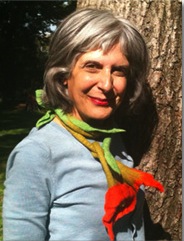
What Is Feminism? by Beverly Donofrio

Editor’s note: The following post is part of a series in which a diverse range of women writers discuss their definition, idea, or experience of feminism. For more background, take a look at our Fall 2012 issue, which features “Bad Feminist” by Roxane Gay. You can find other pieces in this series by clicking here.
———
As I dressed to attend a reading one evening, I considered putting on some makeup, then rejected the idea on feminist grounds: I was new in town, this was my first outing, and I wanted people to meet me true. This made me feel virtuous, until a chic young college woman read her poem: “I think women who don’t wear make-up … are lazy.”
I laughed hard and loud because she was right. I was a sixty-year-old with no under-eye concealer or lipstick, witness to an ideal, who, truth be told, actually had felt too lazy to put on makeup that night, makeup I once would have wagged my finger at myself for even considering. But here’s the beauty in it all: Both the young woman and I have the well-won gift of choice.
I still laugh when I think of that night, but I do not laugh about the night six years before, when I was raped in my bed—the fifth victim of a serial rapist. I will not go into the details except to say the ordeal was short and I was not hurt—if you can ever call being raped not hurt—and that I chased the attacker out by praying Hail Marys, out loud.
And then—looking back, this is hard for me to admit—I considered not calling the police. I had nothing new to add to the rapists’ other victim’s accounts, I told myself, but the truth of the matter was I was ashamed. I did not want to be known for the rest of my life as a woman who had been raped. But almost instantly I changed my mind: I have to report the rape, I thought. I owe it to my sisters. And perhaps it was this feminist thinking that before long urged my heart to rally and shout: You have nothing to be ashamed of, damn it; the rapist does.
——
About the author: Beverly Donofrio’s first memoir, Riding in Cars with Boys, has been translated into sixteen languages and transformed into a popular motion picture. Her second memoir, Looking for Mary (or, the Blessed Mother and Me), began as a documentary on NPR and was chosen as a Discover Book at Barnes & Noble. Beverly is an award–winning radio documentarian and essayist and can be heard on such programs as All Things Considered. Her personal essays have appeared in national newspapers and magazines, such as the New York Times, Washington Post, Los Angeles Times, Allure, Cosmopolitan, New York Magazine, The Village Voice, O, and Spirituality & Health.
